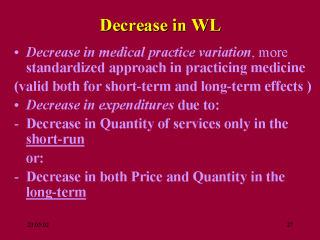| front |1 |2 |3 |4 |5 |6 |7 |8 |9 |10 |11 |12 |13 |14 |15 |16 |17 |18 |19 |20 |21 |22 |23 |24 |25 |26 |27 |28 |29 |review |
 |
a)
Assuming that CDSSís reduce medical practice variation by
minimizing medical errors, it can be hypothesized that widespread employment of expert
systems will decrease welfare loss and alleviate its accumulation in society as a function
of a more standardized approach in health care delivery (again, as a result of reduced
numerator in cov2 / n). This statement is valid both for short-term and
long-term effects. a) WL will diminish also due to decrease in expenditures (as been demonstrated in the section above), in its turn resulting from: - Decrease in Quantity of services only in the short-run The amount of WL would purely depend on the interplay of estimates of P and Q when considering short-term effects, which is difficult to anticipate at this point. |